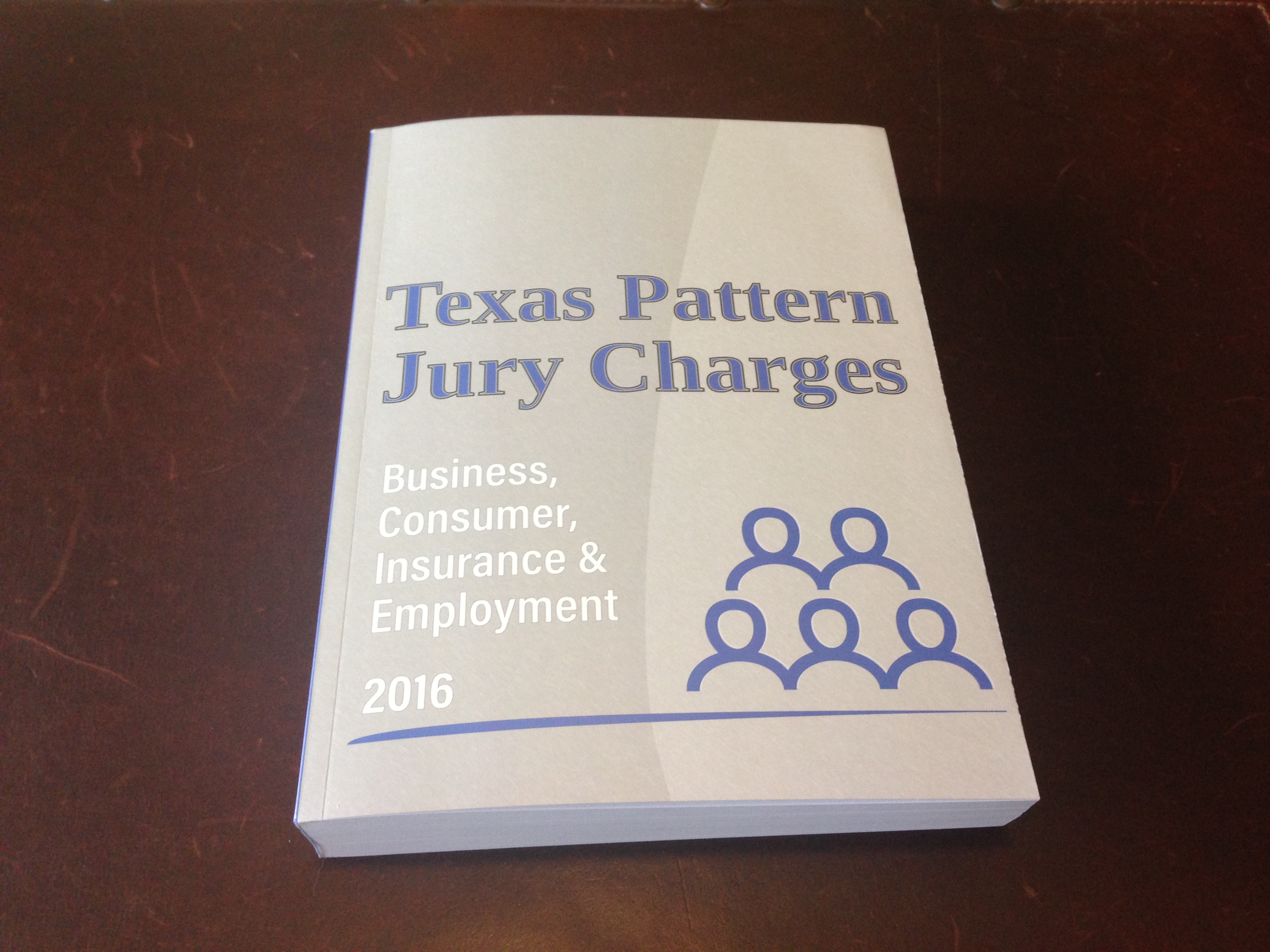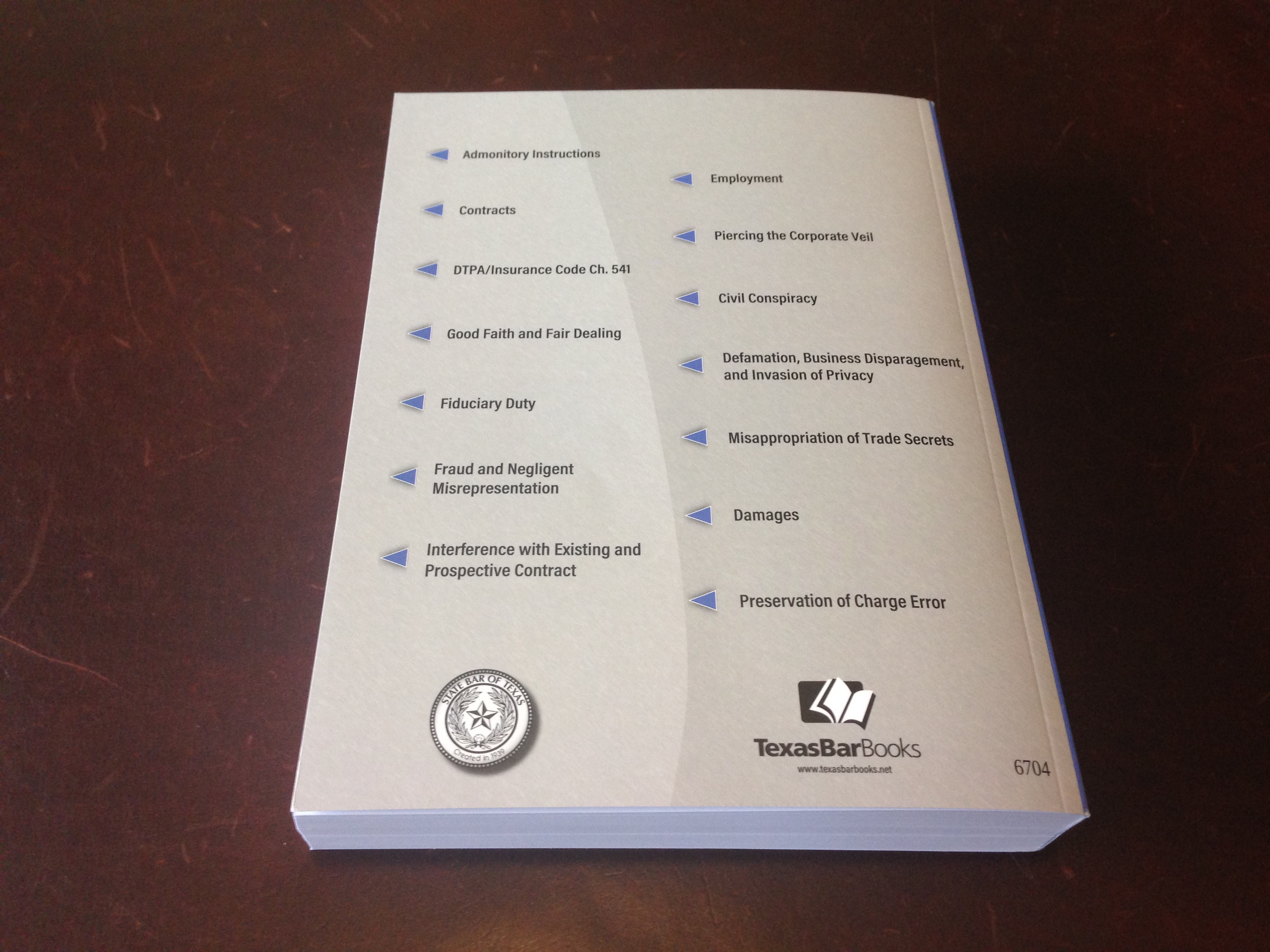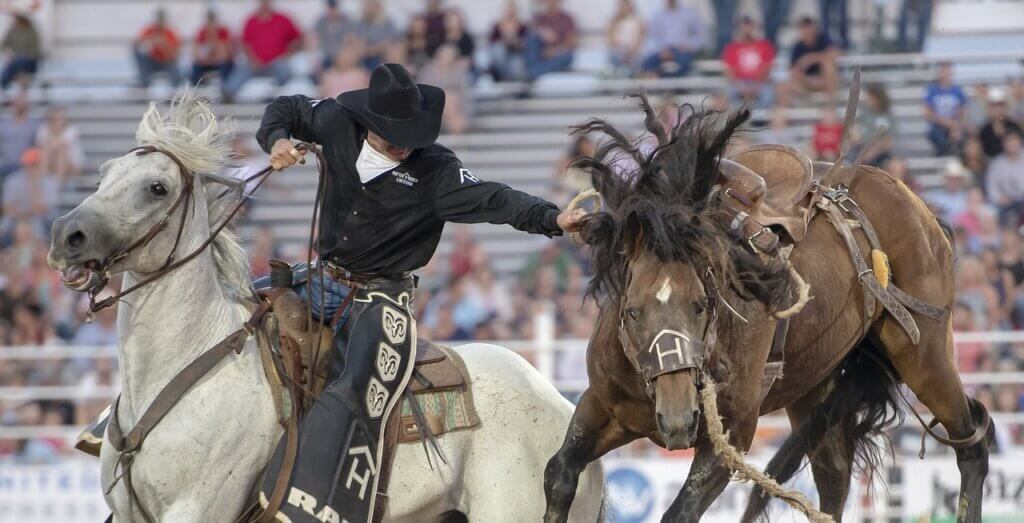How well does the new Texas Pattern Jury Charge perform in a typical soft trade secrets case?
I received a mysterious package in the mail. After tearing open the cardboard, I saw a shiny new paperback in plastic shrink-wrap: the new Texas Pattern Jury Charges – Business, Consumer, Insurance & Employment (2016).
My heart raced. Yes, I already had the 2014 edition, but the 2016 edition has something new: questions and instructions on trade secret misappropriation. In the words of Joe Biden, this is a big f**ng deal!
You see, when I last tried a trade secret case to a jury, there were no Pattern Jury Charge questions for trade secrets, so we had to make up our own. That case was a typical “soft” trade secrets case.
“It’s a dirty story of a dirty man”
Soft trade secrets? Well, there are two paradigmatic types of “hard” trade secrets: secret technology and “secret sauce.” If your company develops new technology that allows you to drill for oil sideways at half the cost of your competitors, and you keep it secret, that’s a trade secret. If you have the secret formula for Coke, or the Colonel’s secret herbs and spices, those are trade secrets. Understanding why these things are trade secrets is not rocket science.
Soft trade secrets, on the other hand, are the type of information almost every business has: names and contact information for customers, information on what the customers buy, prices charged to the customers, names and contact information for vendors, prices charged by vendors, etc. The king of the soft trade secrets is the customer list, which may or may not be a trade secret, depending on the facts (see Customer List Confusion).
In the typical soft trade secrets case involving a departing employee, there are usually four key issues:
1. Did the employee take information from the former employer?
2. Was the information actually “trade secrets”?
3. Did the employee actually use the information to compete with the former employer?
4. What amount of damages did the employee cause the former employer by using the information to compete?
Experts on good writing may cringe at my use of the intensifier “actually,” but it’s appropriate here. It’s a reminder to approach trade secrets claims with a healthy skepticism. As one federal judge said in a recent opinion, “Many plaintiffs allege trade secret misappropriation, but few prove it.”[1]
So how do the new Pattern Jury Charge (PJC) questions compare to these key issues in a typical soft trade secrets case?
“It took me years to write, would you take a look?”
Like other PJC sections, most of the new section on trade secrets consists of commentary on the applicable statute and case law. The questions themselves are quite short. They boil down to this:
1. Did Paul Payne own a trade secret in the ___ listed below? [the jury answers separately for each thing alleged to be a trade secret]
2. Did Don Davis misappropriate Paul Payne’s trade secret?
3. What amount of damages . . . etc. [the standard damages question that applies to all kinds of claims]
This would be simple for a jury to understand but for one problem: How does the jury know what “trade secret” and “misappropriate” mean?
The PJC solves this problem with instructions. The question on ownership of a trade secret is followed by the statutory definition of a trade secret from the Texas Uniform Trade Secrets Act (affectionately known as “TUTSA”). The question on misappropriation is followed by the statutory definition of misappropriation.[2]
This sticks to the basic template for most PJC questions: ask a really simple question, then give detailed instructions that define the terms used in the question. The detailed instructions are, in effect, a mini-tutorial on the area of law at issue.
The questions tend to be broad, rather than focusing on specific facts. For example, in a breach of contract case, the PJC is going to ask “did Don Davis fail to perform the contract?” rather than “did Don Davis fail to deliver the truckload of bricks to the green house on Pecan Street on the date stated in the contract?”
Similarly, the PJC question on trade secret misappropriation asks “did Don Davis misappropriate Paul Payne’s trade secret?” rather than “did Don Davis email himself Paul Payne’s confidential customer list and use it to sell bricks to Paul Payne’s customers?”
For my non-lawyer readers, this is part of what we call “broad-form” submission. Historically, the main reason for broad-form submission was to reduce the likelihood that the jury’s verdict would be reversed on appeal. There is a mountain of case law and articles on what broad-form submission means. It will suffice to say that the rule in Texas is this: broad-form submission is required, except when it isn’t.
“It could make a million for you overnight”
So what’s the alternative to the broadly stated trade secrets questions in the PJC? In the jury trial I mentioned above, we handled it differently. We submitted these questions (I’ve changed the names and the product):
1. Was any of the information Dawn Davis obtained from Paula Payne trade secrets?
2. Did Dawn Davis use Paula Payne’s trade secrets to make window sales at Real Cheap Windows?
3. What sum of money . . . would fairly and reasonably compensate Paula Payne for her damages, if any, proximately caused by Dawn Davis’s use of Paula Payne’s trade secrets at Real Cheap Windows?
Like the PJC, the instructions included the statutory definition of “trade secret” taken straight from TUTSA.
Unlike the PJC, there was no question about “misappropriation,” because it was undisputed my clients had taken the information at issue. My argument was (1) the information wasn’t trade secrets, and (2) my clients didn’t use the information to make the sales. Those were the real issues in dispute, so I argued for submitting those specific questions, and the judge agreed.
I like my questions better than the PJC questions. They get right to the point and are easier for the jury to understand. They don’t require a jury to puzzle over a definition of “misappropriation.” But I admit the form of my questions won’t work in every case.
Why?
First, in my case there was no real dispute about what information was taken. I had asked the plaintiff in discovery to identify the alleged trade secrets, and it identified a specific stack of documents my clients admitted taking. The question was whether the information in those documents was trade secrets.
Second, there was no dispute that my clients had sold products to customers of the first employer after leaving. The dispute was whether they made those sales by using the alleged trade secrets.
So the format we used for the trade secrets questions in that case may not work in your case. But that only proves my point. The PJC should only be a starting point. Judges and lawyers should not be afraid to adapt it to the specific facts of their case.
“It’s a thousand pages, give or take a few”
The new questions and instructions on trade secret misappropriation do what the Pattern Jury Charge is supposed to do. They provide a template for submitting trade secrets misappropriation questions that is consistent with Texas law and broad enough to apply to different kinds of cases.
But that’s all they do. There is a danger of rote use of the PJC questions when more specific questions tied to the facts of the case would be more appropriate and more understandable to the jury.
If the real issue is whether a customer list was a trade secret or not, then why not just ask the jury that? Or if the dispute is about whether the former employee used the employer’s customer list, why not just ask “did Don Davis use Paul Payne’s customer list?”
Of course, the problem is that there is usually a fight between the lawyers over the wording of the jury questions. When the parties don’t agree, the safer thing for the judge to do is to follow the PJC and submit a broad question, rather than a question tied to the specific facts in dispute. This is “safe” in the sense that it reduces the judge’s chance of getting reversed on appeal.
But the safe thing is not always the best thing. Actually.
*Update: For more, see The Jury Charge in Texas Trade Secrets Litigation.
________________________________________________

These are his opinions, not the opinions of his firm or clients, so don’t cite part of this post against him in an actual case. Every case is different, so don’t rely on this post as legal advice for your case.
[1] Kuryakyn Holdings, LLC v. Ciro, LLC, No. 15-cv-703-jdp, 2017 WL 1026025, at *7 (W.D. Wis. Mar. 15, 2017).
[2] The definitions are in Section 134A.002 of the Texas Civil Practice and Remedies Code.






Comments:
Thanks. I’m always going the extra mile for my Fivers.
Way to work in lyrics from one of the Beatles’ most underappreciated songs (“Paperback Writer”)!